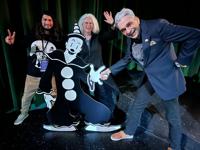
The event known as East LA Meets Napa was held inside Union Station. Photo By Gladys Vargas
The AltaMed Health Service Corporation (AltaMed) fundraiser event called East LA Meets Napa on Friday reached the $1 million mark.
“This is the most we have ever raised in an East LA Meets Napa event,” Sharlene Risdon-Jackson, vice president of foundation development at AltaMed Health Services, told CALÓ News. “All of those revenue resources are going to go back to AltaMed Health Services, allowing us to treat more patients, expand our reach and care for our community better,” she said.
According to Risdon-Jackson, the specific allocations of these funds can go into different things and resources overseen by AltaMed. “The foundation focuses on a lot of different areas. It could be an expansion of services, awareness campaigns, early prevention. Our focus is treating patients while they are healthy, keeping them healthy so that they can thrive,” she said. In addition to that, Risdon-Jackson also said some of the funds could also go into things outside of direct-patient-care deliveries, such as transportation and food services.”
Wine, food, and healthcare were just some of the things that came together at the AltaMed celebration and fundraising event at Union Station in Los Angeles.
The event was part of a series of events commemorating Alta Med’s 55th anniversary of serving people across the L.A. and Orange Counties. The food and wine event also serves as an annual fundraiser for the Southern California non-profit community health center, which today serves half a million people, mostly Latino, multi-ethnic and low-income individuals living in often-overlooked communities.

Cástulo de la Rocha, president and CEO of AltaMed, along with Zoila D. Escobar, president of the AltaMed Foundation and executive vice president and chief administrative officer of AltaMed Health Services. Photo By Gladys Vargas
Now in its sixteenth year, the event featured top L.A. Latino restaurants and Mexican-American vintners with one goal in mind: to gather monetary proceeds that will support the AltaMed Foundation and its mission to reduce health care disparities and provide Latinos and other people of color with quality, culturally competent care.
“The funds that we raise here are essentially used to support those individuals that do not have any form of insurance, or, in other words, they're the working poor of our community. Those dollars are used to help that population primarily,” Cástulo de la Rocha, president and CEO of AltaMed, told CALÒ News.
The event was not only meant to bring together funds; it also gathered and hosted many food and wine Latino-owned businesses such as Pez Coastal Kitchen, Maizano, La Diosa de los Moles, Porto's Bakery and Café, King Taco, Genovese's Kitchen, and more. Participating vintners representing the Mexican American Vintners Association included Aldina Vineyards, Casa Martinez Wines, Delgadillo Cellars, Encanto Vineyards, Esfuerzo Wines, and more. “Latino communities have been producing wines for centuries. [Today] we're now celebrating that we have some incredible winemakers in the Napa region,” de la Rocha said.
Vintners Diary was one of the wine companies and businesses present at the Friday event,Fridays and co-funded by Vanessa Robledo and Jocelyn Solis. The 100% Latina-owned winery originates from a legacy of family members who have been laboring in the Sonoma and Napa wine regions since the late 1940s. Robledo’s great-grandfather, Luis, and his sons lived in a labor camp in Healdsburg, California, and cultivated fruit trees and grapevines in the surrounding fields.
Robledo began learning the wine business at the age of 8 while helping grow the grapes in her family’s vineyard. The mother-and-daughter duo said the annual East LA Meets Napa event does not only help them connect and build community with other vintners but it is also an opportunity to support and care for other Latinos. “It is really important to be able to see your own people becoming successful and elevating each other. It's really nice to have that camaraderie,” Solis said.
Robledo said knowing the impact the event has on Latinos and healthcare makes her proud of being an attendee and sharing her wine at the event. “I’ve known about AltaMed for many years and I've known that they've grown in their ability to help more and more people every year. If we don't have our health, what else do we have?” she said.
Another Latino-owned wine business that was part of Friday's event was Aldina Vineyard from Healdsburg, California. Monica Lopez told CALÒ News that their wine was inspired by her parents. “Al is my father, and Dina is my mother. The Aldina name really stemmed from our parents,” she said. “My dad began his journey in wine as a wine grape grower. He started with minimal acres in Santa Rosa and was selling to different vintners around the county for about a decade. My brother and I decided we wanted to launch our own [wine] and this is it,” she said.
Lopez is also the president of the Mexican American Vintners Association, which AltaMed is a big supporter of.

Attendees enjoying wine at AltaMeds fundraising event. Photo by Gladys Varagas
“55 years ago, AltaMed started as a single free clinic in East Los Angeles. Today, AltaMed provides nearly 2 million patient visits on an annual basis,” de la Rocha said in an opening statement at Friday’s event.
AltaMed’s history dates back to 1969 when a group of Brown Berets launched the East L.A. Barrio Free Clinic. At that time, the clinic relied solely on grants and donations and not having enough of these led to its closing the following year in 1970. It later reopened as La Clinica Familiar del Barrio, where de la Rocha became one of the three paid employees at the time and was hired for a three-month temporary assignment. In 1977, under the Urban Health Initiative, which required 51% consumer representation on the Board of Directors, the organization became a Community Health Center that focused primarily on teens' health before opening the first Adult Day Health Care (ADHC) in California in the early 80s.
Finally, in 1986, La Clinica Familiar del Barrio changed its name to AltaMed Health Services Corporation. Today, AltaMed provides a comprehensive range of primary health, dental, behavioral, senior care, specialty care, and other services to people of color who are not turned away because of a lack of insurance or an inability to pay for services.
"AltaMed has been at the forefront of ensuring, since its inception, that low-income households get the quality of health care that they need and that they deserve," Gil Cedillo, the former L.A. City councilmember, told CALÓ News.
Cedillo, who was present at Friday’s event and who lost his wife to breast cancer, said he has seen firsthand how culturally relevant health care makes a difference in the lives of Latinos.
“Based on my life experience, I have a very passionate view and feeling about ensuring that working people are treated with the dignity and respect they deserve. Part of that means that they have quality health care accessible and available to them, in their language, by people from the community, from their culture,“ he said. “Those are the most vulnerable moments of our community before people hit the challenges [of] dementia and Alzheimer's and all the challenges our families have.”
Today, AltaMed has more than 10 sites throughout Orange County and L.A. It employs about 5,200 people and has a staff of about 600–700 doctors.
Berenice Núñez Constant, senior vice president of Government Relations and Civic Engagement, said one of the things that distinguish AltaMed from other healthcare service providers is that it is a Latino-run and operated organization for Latinos. “We hire from the communities that we’re in, so by design, everyone that works at AltaMed reflects the communities that we're in,” she said.
Núñez Constant, who was born in Long Beach, said she recalls going to community clinics like AltaMed when she was a young girl. ”There's no replacing that lived experience,” she said. “We understand and respect the struggle and all of the work that our communities put forward. When someone can see a doctor, a nurse, that understands them in a real way, it is the game changer of game changers.”
A big part of Núñez Constant’s work focuses on working to eliminate disparities in healthcare access and outcomes, as well as leading policy and civic engagement initiatives aimed at impacting the social determinants affecting many of AltaMed’s patients and communities, something that to her falls hand in hand with physical wellbeing.
“We have to engage our community on the conditions that make them sick outside of the clinic and outside of the exam room,” she said. “If you look around our communities, they are facing issues like pollution, like crime, [or] safety. When our communities are left behind, [they] are sicker and they don't have the power and resources that they should. Our roots are in the racial justice of these communities.”















(0) comments
Welcome to the discussion.
Log In
Keep it Clean. Please avoid obscene, vulgar, lewd, racist or sexually-oriented language.
PLEASE TURN OFF YOUR CAPS LOCK.
Don't Threaten. Threats of harming another person will not be tolerated.
Be Truthful. Don't knowingly lie about anyone or anything.
Be Nice. No racism, sexism or any sort of -ism that is degrading to another person.
Be Proactive. Use the 'Report' link on each comment to let us know of abusive posts.
Share with Us. We'd love to hear eyewitness accounts, the history behind an article.